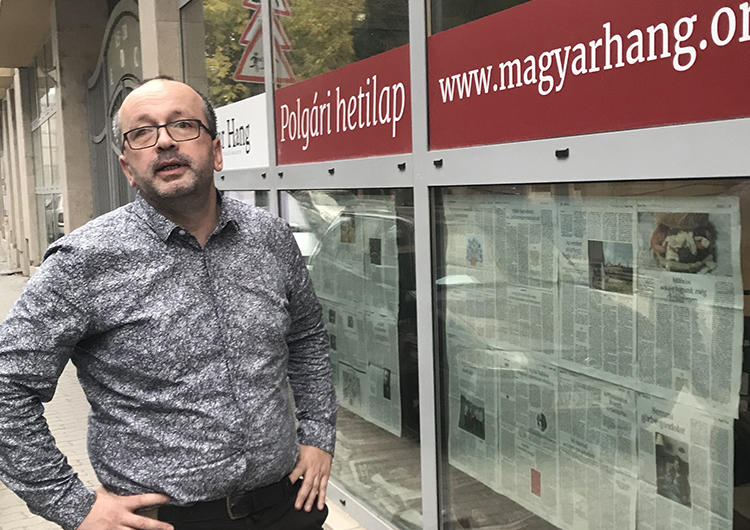In 2018, a group of conservative journalists opposed to Hungarian Prime Minister Viktor Orbán and his right-wing government launched Magyar Hang, an independent weekly magazine. Since then, government officials and their supporters have repeatedly harassed employees of the magazine, calling them “traitors” for opposing Orbán, accusing them of spreading fake news, and threatening them with legal retaliation for their reporting, according to local reports.
On March 30, 2020, amid the COVID-19 pandemic, the Hungarian Parliament approved a set of emergency laws enabling Orbán to rule by decree. The government also introduced new legislation that threatens journalists with prison sentences for spreading false information about the virus.
The World Health Organization has confirmed 2,098 cases of COVID-19 in Hungary as of April 21.
The head of Magyar Hang, Csaba Lukács, spoke with CPJ in a phone interview last week about the challenges of covering the coronavirus crisis in an increasingly repressive environment. His responses were translated from Hungarian and have been lightly edited for length and clarity.
How has the coronavirus crisis affected your coverage?
We have become even more isolated. As of today none–not one–of our COVID-19 related questions have been answered by the government, although there are daily press conferences and we ask several questions every day.
These press conferences are online and the officials decide arbitrarily whose question will be answered. We regularly send questions to various authorities, ministries, hospitals, schools, and local municipalities in the hand of the governing party, but 99 percent of them are never answered.
Reporting has become increasingly dangerous for us in general, and this new legislation is a clear threat. As we have no official confirmation for most anything we publish, the risk of error is bigger and now a simple error can easily end you up in prison as you can be charged with spreading false information.
I expect that the government will show force and will use the legislation at least once against independent outlets like us, but, of course, we do not know who the first victim will be
Have you received any threats due to your reporting?
Yes. Even before the new legislation came into effect, we received answers from officials warning us to be careful with our reporting and that we would be soon sent to prison. After the legislation was introduced, it happened that a hospital, instead of answering our questions, sent us back the text of the law highlighting the prison sentence we can get for spreading false information.
Government supporters send us emails and comments on social media often saying that we should be in prison as traitors or for spreading rumors. Pro-government and state media regularly accuse us of spreading fake news, saying that we are not credible, or we are liars, even if our reporting is solid and well-substantiated.
How does the new legislation affect your ability to do your work?
Sources have become more careful and they are afraid. In the climate of fear which the current government created, it is increasingly challenging to gather information from sources. They do not go on the record, and it has already become difficult to even talk to local officials, like hospital and school directors, as they are saying that they need permission to talk to us from the capital.
We have also had sources who had previously provided us with information withdraw later, as they were intimidated.
Our biggest concern is logistical, but it is also related to the climate of fear. As no Hungarian print house accepted to print our publication out of fear of falling out with the government, our weekly is printed in neighboring Slovakia.
Now, when the [coronavirus] crisis started, we asked Hungarian print houses again for a price quote, but the answer was the same as two years ago, at the time of our launch: they do not have capacity for us, a magazine of around 11 thousand copies. It is strange because several Hungarian publications decided to stop their print runs, so in theory there should be free capacity in the country’s print houses.
Because of the lockdown and the tighter controls at the border, resulting in longer queues for the lorries transporting our newspaper, it has become a nightmare to be able to deliver our copies on time.
How have your readers responded to these obstacles?
Hundreds of newsstands have closed, and newsstand sales have collapsed in the country due to the lockdown, which is a challenge for us as our newspaper relies heavily on this revenue source. More than 70 percent of our copies are sold at the newsstands.
The reason for that is that a lot of our supporters were afraid to subscribe out of fear that their names would eventually leak and the authorities would know that they support a critical-minded newspaper.
As a positive development, however, some of them in this current situation decided to support us by subscribing, and a lot of people are sending encouraging comments saying that they need our newspaper, more than ever before.
